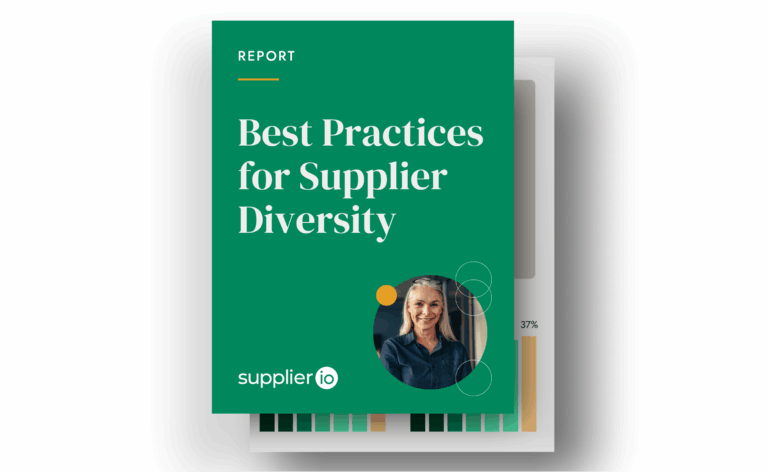To Drive Maximum Business Value, Align Your ESG and Supplier-Diversity Programs
Responsible sourcing means ESG and supplier diversity working together to drive business benefits, reduce risk, increase innovation, and support the communities you do business in.

Supply chain sustainability and social responsibility are no longer optional. Today, nearly 97% of the largest US companies have an ESG program of some kind.
With nearly every major company investing in sustainability in some way, what differentiates the ESG leaders from laggards? One of the most important factors is the integration between ESG and supplier diversity. Research indicates that alignment between the two is key for maximizing business and societal impact:
- The Hackett Group’s 2022 supplier-diversity study shows all top-performing companies in North America have a supplier-diversity program. What’s more: 75% of top-performing companies in Europe have one, too.
- McKinsey & Company research shows that as of 2022, 82% of Fortune 200 companies in the US had a formal supplier-diversity program.
Our own research – which we published last week in our 2023 State of Supplier-Diversity study – reinforced the dual approach: 55% of companies said ESG initiatives help drive their supplier diversity program.
There was some concern that due to current economic conditions, procurement teams might be forced to choose between ESG and supplier diversity investments. However, the opposite proved to be true: Our research found that most businesses (69%) report that the current economic climate has had minimal impact on their supplier diversity programs, and 89% expect business support to stay the same or increase in the upcoming year. Only 11% reported that their supplier diversity program was pulling resources away from ESG.
ESG and Supplier Diversity – More Effective, Together
ESG programs expand the benefits of supplier diversity by multiplying its value across a supply chain’s environmental, social, and governance domains. Put another way, diverse suppliers help companies improve performance and impact on each – and in novel ways that less diverse companies cannot.
Expanding your supplier-diversity program into a broader ESG program enables organizations to:
- Drive more business benefits: Companies can see year-over-year cost savings of 8.5% (compared to the 3-to-7% annual procurement savings that most organizations realize). And, according to the Hackett Group study, companies with active supplier- diversity programs boost their brand and reputation – for consumers and employees.
- Combat different, or broader risk events: Diverse suppliers typically are closer to their markets, partners, and production locations, and thus have lower environmental impact. Because they tend to be smaller, diverse suppliers can be more accountable on issues such as labor and wage disputes and product/service delivery.
- Engage with more suppliers to drive innovation and resilience: Diverse suppliers can more quickly and nimbly improvise, adapt to, and overcome supply-chain events and disruptions, such as stock outs or other suppliers falling through. And they’re incentivized to be more responsive – they want to win or retain you as a customer and are motivated to go the extra mile for you.
- Have a bigger impact on local economies, and society: According to McKinsey’s research, diverse suppliers are 67% more likely to hire minority talent than the average for US companies; and they’re more likely to hire more minorities at management and executive levels. They’re also more likely to pay their employees higher salaries. For example, minority and women-owned businesses in higher-growth sectors pay an average of 48% more than companies in traditional sectors, which also benefits their local communities via philanthropy.
The bottom line: Intentionally integrating supplier diversity and ESG factors into the broader supply chain sustainability program results in many benefits internally and externally – from cost savings and risk management to innovation and societal impact. And, for procurement, it’s really a no brainer, as the Hackett Group found that 99% of diverse suppliers ultimately meet or exceed expectations.
At the end of the day, the ultimate goal of any ESG program is to drive responsible, sustainable, and accountable sourcing decisions that create broad-based business value. It’s not about checking a box or looking good in your quarterly or annual reports; it’s about increasing business performance, supply chain competitiveness, and sustainability outcomes through your ESG commitments. The best way to do that: intentionally investing in and integrating ESG and supplier diversity together.
Interested in learning more? Read more about Supplier.io’s strategic expansion in the ESG space and how we can help tackle supply chain sustainability and diversity together.




